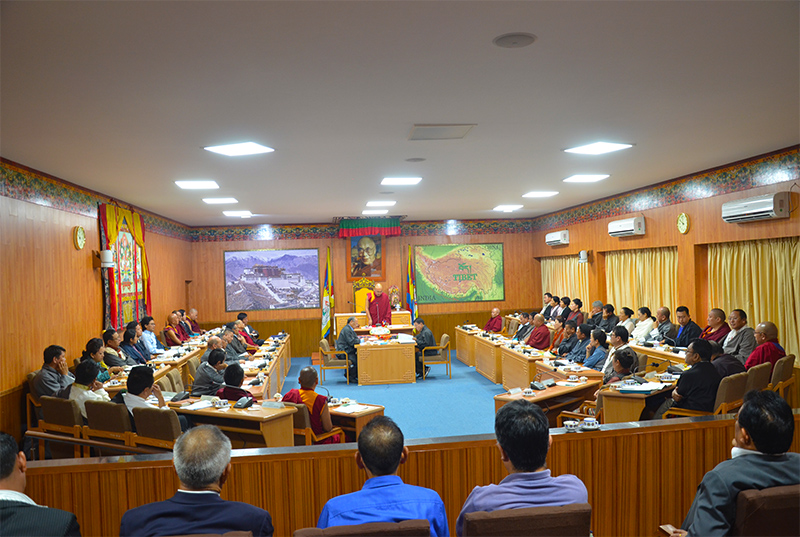 Dharamshala — The second session of 16th Tibetan Parliament-in-Exile commenced with the first discussion being about the present situation Tibet due to rigid Chinese policies and the role of Tibetan diaspora and the international group in looking into these issues and subsequently dealing with them.
Dharamshala — The second session of 16th Tibetan Parliament-in-Exile commenced with the first discussion being about the present situation Tibet due to rigid Chinese policies and the role of Tibetan diaspora and the international group in looking into these issues and subsequently dealing with them.
Speaker of Tibetan Parliament-in-Exile, Khenpo Sonam Tenphel started the opening speech by criticising the repressive and punitive policies of the Chinese government targeted at the freedom and self-determination of the Tibetan people.
“In the light of ongoing repression of Tibetan language, identity and religion, Chinese policies on Tibet is seen to be explicitly severe and more repressive. However the courage and spirit of the Tibetan people, who are suffering the oppression inside Tibet, has not been stymied,” Speaker said, calling for revamped initiatives of the Tibetan people and support of the international communities in addressing the issues facing Tibet.
Ngodup Dorjee, Secretary (SARD) – for Department of Finance said that the second session mainly deals with the accountability of each department and the subsequent annual reports, based on which amendments may be proposed.
A woman member of the Parliament named Tsering Youdon, who is serving her third term, mentioned, "All the departments will provide their Annual report and based on that every department, they will have their doubts or any questions that need to be done by the department... ". Furthermore she added, "It's department-wise, what all they have done during the year...It started with the religion department and after than all the departments will come."
Another woman member, Dolma Tsering, elected since the 13th Parliament said that, "the main focus of this sense is like the accountability of all the departments, how they work and looking into the loopholes, whereby they can preach better with the Tibetan diaspora". When she was asked about Tibet attaining freedom of China, she commented that, "that big hope is still within us and the main capital for that hope is the Tibetan inside Tibet have a great hope, the flame is still burning highly in the youth of Tibet."
She also said in India, for the Tibetans the literacy rate is around 75% and in all the Tibetan schools, Tibetan is the medium of instruction. "Without knowing Tibetan, your Tibetanness doesn't work and that Tibetans are very much rooted in their culture."She further added that, "Dalai Lama is the symbol of Tibet, he is the symbol of our struggle and that he was very adamant, he said, we must go according to international way of administration and so to have a say of people, people's representation is very important and thereby to have a Tibetan Parliament is important. "
Migyur Dorjee, one of the male 44 members, formerly a civil servant, who has been recently elected stated that, "September is normally meant for Annual report discussions and march is for budget.." Then, he proceeded to say that, "Seeing the next generation's enthusiasm, their commitment to the cause, I am quite sure the Tibetan struggle will continue. Struggle has to be carried by not only His Holiness the Dalai Lama but also by the people. There are quite few Tibetans who are married to foreigners and their children, surprisingly, prefer themselves to be called not Belgian, Swedish or British but Tibetans..."
The first day of the session passed three resolutions of mourning and four resolutions of solidarity with the Tibetans inside Tibet. The first day of the session also saw the approval of Kalons nominated by Sikyong Dr Lobsang Sangay for his 15th Kashag.
The second session will end on 29th September, 2016.


![Tibet has a rich history as a sovereign nation until the 1950s when it was invaded by China. [Photo: File]](/images/stories/Pics-2024/March/Tibet-Nation-1940s.jpg#joomlaImage://local-images/stories/Pics-2024/March/Tibet-Nation-1940s.jpg?width=1489&height=878)















